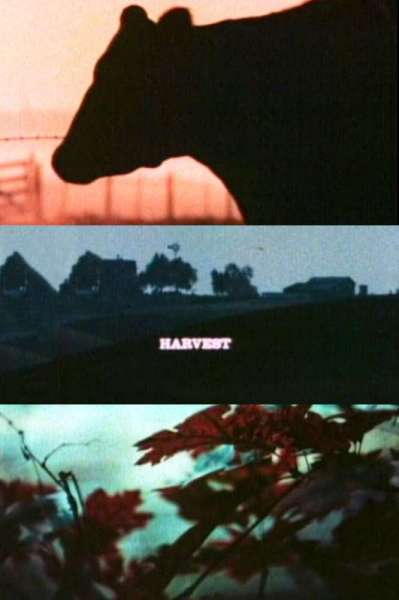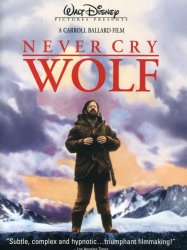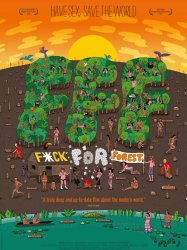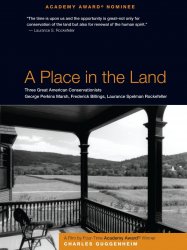Harvest is a american film of genre Documentary directed by Carroll Ballard released in USA on 1 january 1967
Harvest (1967)

If you like this film, let us know!
Released in USA 1 january 1967
Directed by Carroll Ballard
OriginUSA
Genres Documentary
Themes Environmental films, Documentary films about business, Documentary films about environmental issues
Rating68%










Harvest is a 1967 American documentary film produced by Carroll Ballard. It was nominated for an Academy Award for Best Documentary Feature. The film portrays the American farm and farmer at harvest time, beginning in Texas with the first cutting of winter wheat, and following the season north to the Canadian border.
Comments
Leave comment :
Suggestions of similar film to Harvest
There are 6 films with the same director, 8961 with the same cinematographic genres, 1248 films with the same themes (including 93 films with the same 3 themes than Harvest), to have finally 70 suggestions of similar films.If you liked Harvest, you will probably like those similar films :

Never Cry Wolf (1984)
, 1h45Directed by Carroll Ballard
Origin USA
Genres Drama, Action, Adventure
Themes Films about animals, Environmental films, Transport films, Aviation films, Films about dogs, Wolves in film, Children's films, Mise en scène d'un mammifère
Actors Charles Martin Smith, Brian Dennehy, Tom Dahlgren
Rating74%





Young, naive Canadian biologist Tyler (Charles Martin Smith) is assigned by the government to travel to the isolated Canadian arctic wilderness and study why the area's caribou population is declining, believed to be due to wolf-pack attacks; amongst his orders to study them he is also given a gun and required to kill one wolf and examine its stomach contents. Tyler receives a baptism of fire into bush life with a trip by bush plane piloted by Rosie (Brian Dennehy). After landing at the destination, Rosie leaves Tyler in the middle of a sub-zero frozen Arctic lake. Tyler's indecision imperils him when falls into the freezing water, until he is rescued by a travelling Inuit named Ootek (Zachary Ittimangnaq), who builds a shelter for him.

Koundi et le jeudi national (2010)
, 1h26Origin Cameroun
Genres Documentary
Themes Environmental films, Films about the labor movement, Documentary films about business, Documentary films about environmental issues, Documentaire sur le monde paysan, Documentaire sur le monde du travail
Koundi is a large village with around 1,200 inhabitants, located in Cameroon's East Province. Aware of Koundi's richness in timber, the villagers decide to use it to alleviate poverty. They organise a union, the Organisation for Communal Interests, and create a cocoa plantation over several hectares to be able to depend on themselves. They also institute "National Thursday": Once a month, they all work on the development of the cocoa plantation. Village life through the prism of self-management.

Mine Your Own Business (2006)
Directed by Phelim McAleer, Ann McElhinney
Origin USA
Genres Documentary
Themes Environmental films, Documentary films about business, Documentary films about environmental issues
Actors Phelim McAleer
Rating60%





 , 1h28
, 1h28Origin USA
Genres Documentary
Themes Environmental films, Films about families, Documentary films about business, Documentary films about environmental issues, Documentaire sur une personnalité
Rating69%






Farmland (2014)
, 1h17Directed by James Moll
Origin USA
Genres Documentary
Themes Environmental films, Documentary films about business, Documentary films about environmental issues
Rating62%





The goal of the film is to bridge the gap between food growers and food consumers by presenting farmers' and ranchers' perspectives on producing food. The film aims to do this by focusing on the lives of six farmers in their 20s who describe their experiences of and views on modern farming and ranching in the United States.

Fuck for Forest (2012)
Genres Drama, Documentary
Themes Environmental films, Films about sexuality, Films about pornography, Documentary films about business, Documentary films about the film industry, Documentary films about environmental issues, Documentary films about nature
Rating52%





The documentary follows Fuck for Forest, or FFF, a non-profit environmental organization founded in 2004 in Norway by Leona Johansson and Tommy Hol Ellingsen, which raises money for rescuing the world's rainforests by producing pornographic material or having sex in public.

Cursed for Gold (2008)
, 1h33Directed by Olivier Weber
Origin France
Genres Documentary
Themes Environmental films, La mondialisation, Films about the labor movement, Documentary films about business, Documentaire sur l'altermondialisme, Documentary films about environmental issues, Documentaire sur le monde du travail, Documentary films about nature, L'Or

A Place in the Land (1998)
, 32minutesDirected by Charles Guggenheim
Origin USA
Genres Documentary
Themes Environmental films, Documentary films about business, Documentary films about environmental issues
Rating61%






After Winter, Spring (2015)
, 1h15Genres Documentary
Themes Environmental films, Documentary films about business, Documentary films about environmental issues
Rating67%






Voices of Transition (2012)
, 1h5Origin France
Genres Documentary
Themes Environmental films, La mondialisation, Films about the labor movement, Documentary films about business, Documentary films about environmental issues, Documentary films about technology, Documentaire sur le monde du travail, Disaster films
Rating75%





Using interviews and overlays of graphics and text, the film presents the current problems facing industrial agriculture. It explores why in the interviewees' view the current industrial model is not up to the task of feeding the world's people. According to the film every calorie of energy contained in a food source currently takes between 10 and 20 calories of crude oil in the production of fertilizers and transportation to produce, leading to a strong dependence of the cost of food on oil prices. As a result of peak oil and increasing oil prices this dependence will lead to ever increasing food prices. According to the film, this dependence already represents a significant weak-spot in the global food supply chain. Additionally, agriculture is already responsible for 40% of greenhouse gas emissions, contributing to climate change. Furthermore, the film argues that the overuse of inorganic fertilizers has been responsible for the loss of soil fertility and threatens the complete loss of usable soil within the next decades through soil erosion and sinking crop yields. These effects, according to the film, can only be partly mitigated by the increased use of those same fertilizers. The loss of workplaces, the concentration of land in the hands of a few (allegedly a farm closes every 23 minutes in France) as well as the dependence on large corporations are enumerated as side effects of the industrialisation of agriculture since the 1920s. Companies, such as Monsanto and Bayer, control everything from seed stock to fertilizers and the necessary chemical mixes for hybrid plants, thereby controlling the entire supply chain. The film argues that this development was supported through subsidies from the World Bank. Interviews with Vandana Shiva, the founder of the Transition Towns movement Rob Hopkins and various agricultural experts serve to argue this viewpoint. The dependence on crude oil is illustrated through the example of the wholesale food market in Rungis.
 Connection
Connection